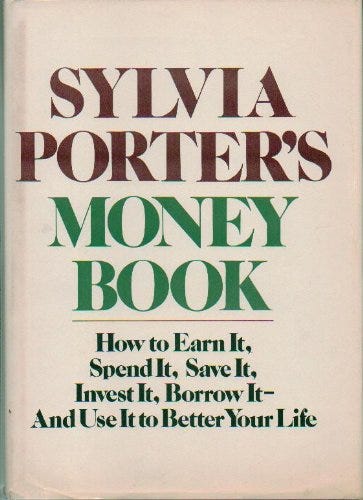Top Financial Books by Decade: Sylvia Porter
1975: Sylvia Porter's Money Book - How to Earn It, Spend It, Save It, Invest It, Borrow It and Use It to Better Your Life
Personal financial advice is heavily influenced by the prevailing economic conditions of the time.
Understanding the top financial books across decades can help investors avoid repeating the same mistakes today.
Before Dave Ramsey or Suze Orman, there was Sylvia Porter.
Sylvia got her start during the Great Depression where she wrote a weekly column in the American Banker on government securities.
For more than 50 years, she wrote as a financial columnist giving out straightforward advice to middle class Americans.
By 1975, Sylvia Porter was a household name with her New York Time’s Best Selling Book:
Sylvia Porter’s Money Book: How to Earn It, Spend It, Save It, Invest It, Borrow It— And Use It to Better Your Life.
The book sold over 1 million copies and was over 1,105 pages.
Betty Furness of NBC’s Today Show said that the book “should be on every family’s book shelf, along with the Bible and the dictionary”.
She advised President John F. Kennedy on his speechwriting, President Lyndon Johnson on his budget, and President Gerald Ford on inflation.
Why is Sylvia Porter not widely known today?
Perhaps recent decades of zero interest rates, rampant money printing, and consistently rising stocks overshadowed Porter’s advice.
Looking back, in 1975, annual inflation clocked in at +9.1% and the S&P 500 posted a +37.2% total return.
The times required a unique perspective.
Sylvia’s opening foreword of her book highlighted the challenges:
“The American marketplace is an economic jungle. As in all jungles, you easily can be destroyed if you don’t know the rules of survival.”
During that era, the primary objective was merely survival.
Porter’s book paints a picture of a marketplace that was tumultuous, unpredictable, and fraught with challenges.
The survivalist mindset of that time contrasts sharply with today's prevalent attitudes, epitomized by phrases like “buy the dip” or “stocks only go up.” These modern sentiments are driven by a fear of missing out.
It's worth revisiting this perspective.
Sylvia believed that investing in the stock market is a good idea, but it was important to do so through economic conditions and to avoid emotional decisions.
“You must have the emotional temperament to own stocks. If you are so nervous about owning stocks that you can’t take a trip without worrying about what is happening to your stocks, stay out of the market.”
Porter was regularly teaching fiscal prudence and self discipline.
She held the view that financial advice should be tailored to the individual, considering generic household averages as merely tools "helpful for economists" but not practically useful for everyday people.
She strongly recommended that one's monthly expenditures should align with their income, “match income to outgo” and overspending as “the major personal problems of our generation.”
While the core principles of saving and investing wisely remain foundational, the specifics of how we implement them today should be responsive to the world around us.
Final Word
We're grateful for the opportunity to learn, grow, and invest alongside you at Tuttle Ventures.
Like what I have to say?
Let’s discuss your individual investment portfolio by scheduling a time below:

Book a meeting with Darin Tuttle
Best regards,
This is not investment advice. Do your own due diligence. I make no representation, warranty or undertaking, express or implied, as to the accuracy, reliability, completeness, or reasonableness of the information contained in this report. Any assumptions, opinions and estimates expressed in this report constitute my judgment as of the date thereof and is subject to change without notice. Any projections contained in the report are based on a number of assumptions as to market conditions. There is no guarantee that projected outcomes will be achieved.
Neither the publisher nor any of its affiliates accepts any liability whatsoever for any direct or consequential loss howsoever arising, directly or indirectly, from any use of the information contained herein.
Unless there is a signed Investment Management or Financial Planning Agreement by both parties, Tuttle Ventures is not acting as your financial advisor or in any fiduciary capacity.





Great find! It would be great to hear more perspectives from economists and advisers who were practicing in the 1970s.